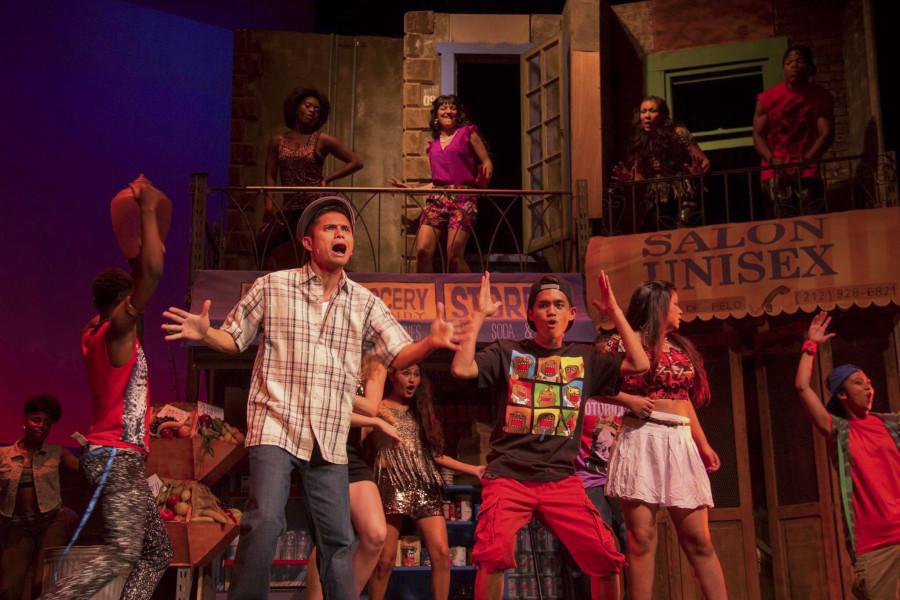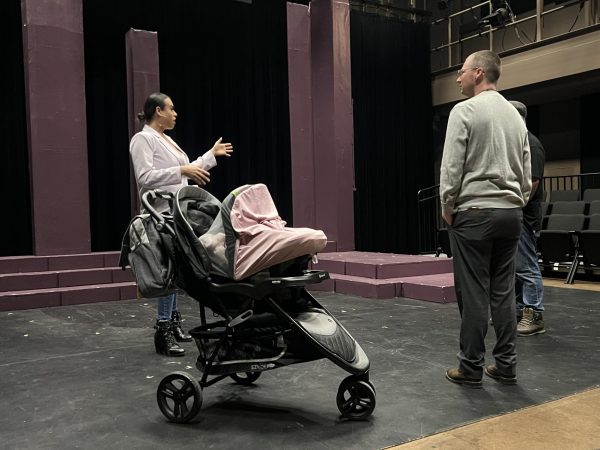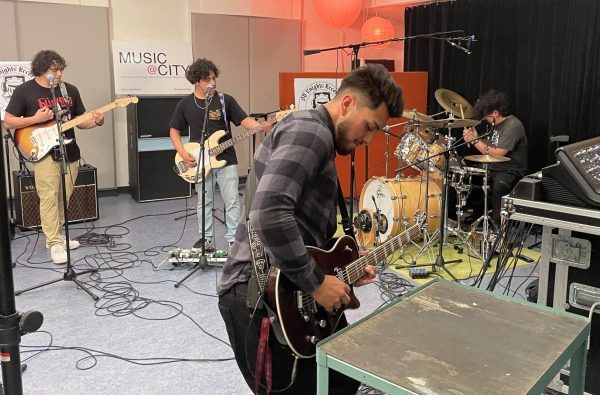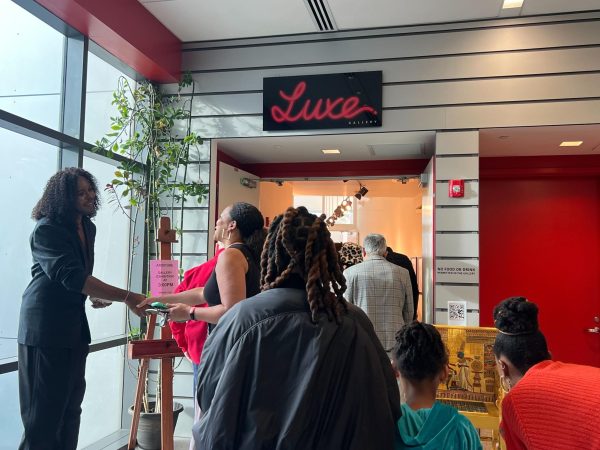Shining the spotlight on the spring semester
Moving into a newly renovated C building, a variety of performance opportunities and a new adjunct instructor await theater students in 2016
For the spring 2014 musical, the San Diego City College theater department decided on the hip hop and Latin influenced “In the Heights,” set Washington Heights, New York. Photo credit: Celia Jimenez
December 15, 2015
New dressing rooms, a costume-making classroom and set construction classrooms in the redesigned C building, as well as a new costume design instructor, will greet San Diego City College theater students during the spring semester.
Voice for the Actor and Movement for the Actor — two classes previously required for as a theater major — have now been replaced by two general education classes due to low class enrollment in the past. Those classes will be offered again in the future — one during the fall semester and one in the following spring semester — according to Visual and Performing department co-chair Katie Rodda.
New adjunct instructor Jeannie Galioto will begin teaching the Beginning Costuming class in the drama department during the spring semester. According to her website www.jeanniegalioto.com, she has taught at the University of San Diego, San Diego State University, The Art Institute, The Fashion Institute of Design and Merchandising and the University of California, Irvine.
The costuming class was cancelled during the fall semester, but the new class will take place in a sewing room in the redesigned C building, which is opening for the spring semester, Rodda said.
“Our costume lab was a place that was a sad state of being — in the old space, we had a costume storage room and a costume lab and the costume lab was so small that they spilled out into a classroom, so we ended up not being able to use an actual classroom because it ended it up being a dedicated sewing room,” Rodda said. “This is all one room, beautiful sewing room, state-of-the-art. There’s going to be a washer and dryer in there that’s brand spanking new, a craft and a dye room, so there’s space to do smaller pieces and to safely dye costumes, so it’s going to be really nice.”
Tom Fine, the project manager for City College who has overseen the Propositions S and N bond construction projects since 2007, said that City College has received about $470 million for Props. S/N projects to date. Of that, $21 million has gone into renovating the C building and $104 million went into the construction of the Arts and Humanity and Business Technology buildings, which was a combined project.
The Black Box Theatre, one drama specific classroom and several other shared classrooms in the AH building have been available since building opened in fall 2014, but the space has been used as a dance classroom while the C building was being renovated, Rodda said.
This spring, the Black Box Theatre will be the home of the “Festival of New Works” March 4-12. The plays were written by seven City College students through a play-writing class during the spring 2015 semester and they will be directed by Matt Thompson, Farrell Foreman and Rodda.
Instead of a musical during the spring 2016 semester, the first straight play in many years will be performed on stage at the Saville Theatre April 15-24. Written by playwright John Cariani, “Almost, Maine” will be directed by Ashley Kobza.
Visual and performing arts department technical director and lighting designer Robert Norberg, who has worked at City College since 1979, is looking forward to the new building opening up and believes that it will serve the students well.
“From my perspective, the new space that’s related to how I interface with the building is incredible because we have really perfectly designed costume and makeup rooms and it’s big enough now for students,” Norberg said. “It seems like it’s laid out really nicely … It all looks really amazing and the costume storage area is really fabulous with a beautiful room for teaching costume construction and sewing classes.”
Despite being excited about the new space, Norberg said he feels that some of the construction work involved with renovating the C building instead of designing and building a brand new building resulted in less than ideal aesthetics.
“Because of the nature of doing a redo rather than a ‘made from scratch,’ it’s like a lot of the conduit and the things — that I added some and didn’t use other conduits — there are portions of the building in the interiors that look kind of sloppy because of all the bringing things up to code and putting what they call ‘conduit’ all over the walls,” Norberg said. “They didn’t take into consideration some of the things that people were offering them concerning how to make the building work.”
Though Fine said that several people have mentioned that the Saville Theatre also needs to be renovated, but funding for that was not included in the Props. S/N proposals.
“It wasn’t included in the bonds — the language that says ‘this is what we’re going to do with this money;’ it’s not included in that,” Fine said.
Norberg said that he thinks part of the reason why the Saville Theatre was not included in the Props. S/N bond measures is that it may have been seen as “frivolous” and that making it Americans with Disabilities Act (ADA) compliant may have been an expensive endeavor.
“I think the more pertinent reason or the more germane reason is that if you go in and have to rebuild the whole theater, you’re going to immediately have to be ADA compliant,” Norberg said. “You would have to put in an elevator to the booth, you’d have to put an elevator into the orchestra pit and also the stairs going down into the prop storage underneath the stage. Right there, the cost, I’m guessing from a construction standpoint, would be very high.”
Rodda added that though the lack of ADA compliance has not been an issue in the past, it may be in the future, saying “a lot of the areas in the theater are not wheelchair accessible, they’re not ADA compliant, so that’s a big problem because as soon as we have a student who is unable to walk up and down stairs who enrolls for our classes, then we’re faced with a lawsuit … we’re kind of on borrowed time, I feel.”
Despite not being formally included in the bonds, the attachment to the C building meant that the Saville Theatre needed several updates — some temporary and some permanent — while the internal demolition and construction took place.
“When we renovated the C building, obviously we had to demolish the interior, which meant taking out the water, electrical, fire alarm, sprinkler systems, heating and air conditioning, but all of that was connected to Saville Theatre,” Fine said. “We had to keep Saville Theatre operational while we renovated the C building. So, we had to run temporary lines over, and in some cases, we just put in new lines in the theater.”
Dave Fremland, a musical theater major at City College, said that the department is well organized and that the teachers within it work well with the students. Something he said could be improved, however, is the availability of classes being offered, which has been affected by limited time slots and class cuts.
“I don’t think that there’s enough of the classes that are needed actually offered in (convenient) time slots,” Fremland said. “It’s difficult to make my schedule plan around some of the classes because some of the classes are limited to when they’re available.”
Though he said that the new C building opening up is exciting, something that Fremland believes would improve the drama department for students would be the ability to take certain courses — such as scene painting, stage makeup and dance classes — over and over again to improve individual skill levels.
“A big problem is that you can only take certain classes so many times that you might need to take over and over again — for example painting, for example tap, different dance classes you can only take them up to a certain point, but maybe it takes longer for your body to develop the movements or the skills,” Fremland said. “For example, the scene painting class — you might have to take that class five times to get to the level that I would consider beginner level, but really you can learn the skill but you can’t practice it enough.”
Auditions for both “Almost, Maine” and “The Festival of New Works” will take place in the Saville Theatre on Jan. 28 at 6 p.m. Those who wish to audition should prepare a one- to two-minute, contemporary monologue. More information will be available on the City College Theatre blog at http://citycollegetheatre.blogspot.com.













